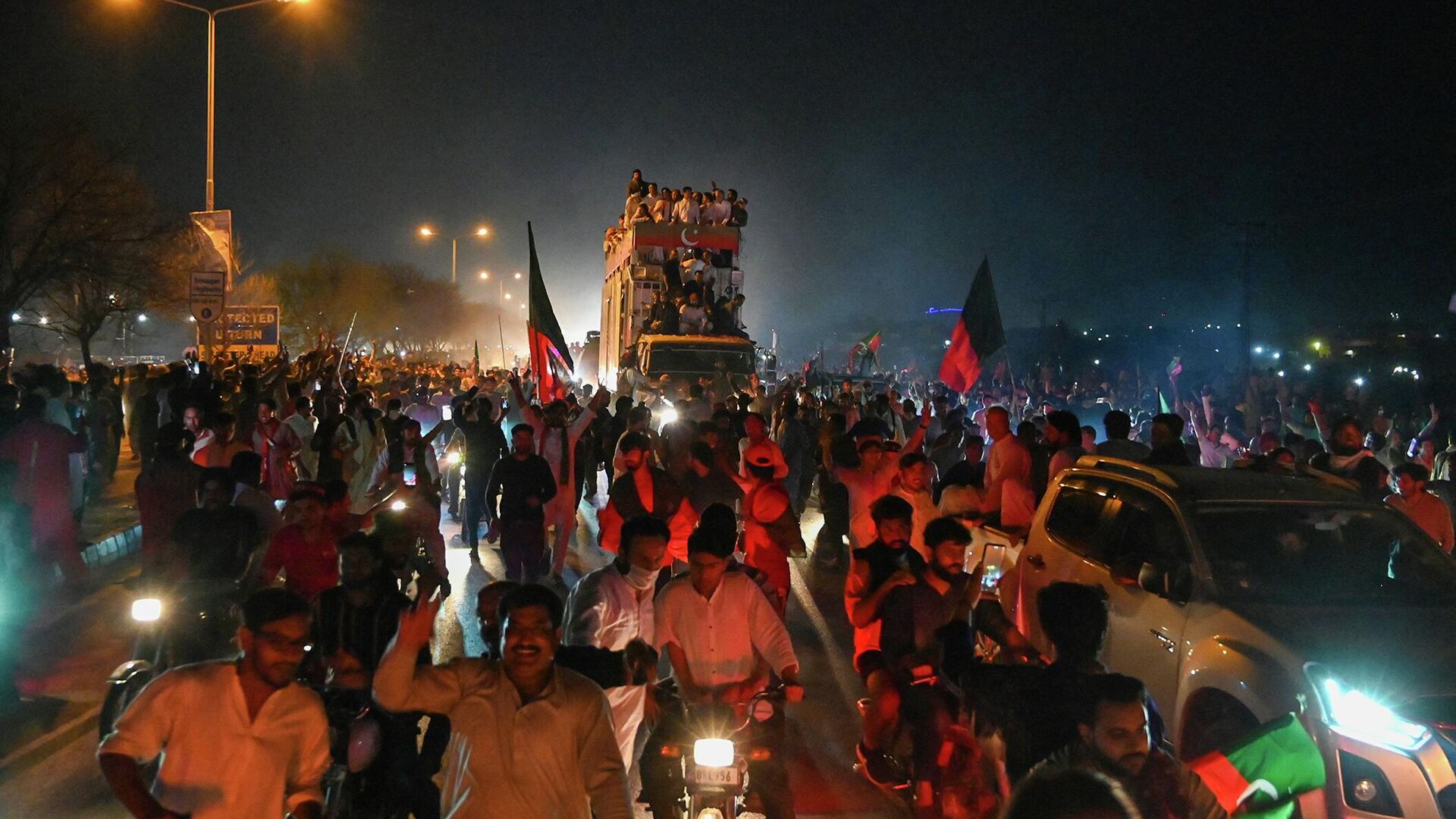https://sputnikglobe.com/20220528/concealing-facts-pakistan-pm-shehbaz-sharif-blames-predecessor-for-countrys-economic-mess-1095841088.html
'Concealing Facts': Pakistan PM Shehbaz Sharif Blames Predecessor For Country's 'Economic Mess'
'Concealing Facts': Pakistan PM Shehbaz Sharif Blames Predecessor For Country's 'Economic Mess'
Sputnik International
After the country's forex reserves plummeted to $10.1Bln on 20 May, Pakistan's government was forced to enact measures to "save the nation from bankruptcy"... 28.05.2022, Sputnik International
2022-05-28T07:54+0000
2022-05-28T07:54+0000
2024-06-08T13:07+0000
pakistan
imran khan
shehbaz sharif
prime minister
prime minister
fuel
petrol
diesel
diesel
fuel prices
https://cdn1.img.sputnikglobe.com/img/07e6/05/1c/1095842922_0:110:2112:1298_1920x0_80_0_0_83889f74adbbeb4ff8d7e709d6adf1f2.jpg
Pakistan's Prime Minister Shehbaz Sharif has blamed the government of his predecessor Imran Khan for the country's economic woes.Sharif's remarks during an "address to the nation" on Friday came in the wake of his government's decision to withdraw fuel subsidies, and increase the prices of petrol, diesel, and kerosene, causing widespread anger among the citizens of the South Asian nation.Petrol now costs 179.86 ($0.90) Pakistani rupees per litre, diesel 174.15 ($0.87) rupees per litre and kerosene 155.56 ($0.78) rupees per litre.Sharif declared that his regime's move was essential to protect the country's foreign currency reserves and stop the country descending into the financial mayhem at present dogging Sri Lanka.The island nation just to the south of India is in economic crisis, with fuel, medicines, and essential food items in short supply, forcing its Prime Minister Mahinda Rajapaksa to step down from his position.Sharif insisted that the decision to raise fuel prices was "difficult" but his government had opted for it with a "heavy heart".Pakistan's decision to raise fuel prices came after Federal Finance Minister Miftah Ismail returned from Doha where Pakistani officials have been renegotiating a $6Bln economic bail-out package with the International Monetary Fund (IMF).The package was originally signed by the previous Khan-led government in 2019.But the global financial agency put it on hold after the cricketer-turned-politician's government failed to cut subsidies and proved unable to increase overall collections.Abolishing fuel subsidies was one of the terms set by the IMF for releasing the next installment of the Extended Fund Facility programme.However, Sharif's move was heavily criticised by former premier Imran Khan, who said Pakistanis were due a "massive dose of inflation" because of the staggering increase in prices.Pakistan's economy is in a precarious situation at the moment with $6.4Bln to be paid in US dollar bonds and loans in the next three years, and another $3.16Bln debt due this year, data compiled by financial news outlet Bloomberg said.
pakistan
Sputnik International
feedback@sputniknews.com
+74956456601
MIA „Rossiya Segodnya“
2022
Pawan Atri
https://cdn1.img.sputnikglobe.com/img/07e5/05/12/1082926219_0:0:358:358_100x100_80_0_0_aca1d9bdccc7af990e49b4511ee80344.png
Pawan Atri
https://cdn1.img.sputnikglobe.com/img/07e5/05/12/1082926219_0:0:358:358_100x100_80_0_0_aca1d9bdccc7af990e49b4511ee80344.png
News
en_EN
Sputnik International
feedback@sputniknews.com
+74956456601
MIA „Rossiya Segodnya“
Sputnik International
feedback@sputniknews.com
+74956456601
MIA „Rossiya Segodnya“
Pawan Atri
https://cdn1.img.sputnikglobe.com/img/07e5/05/12/1082926219_0:0:358:358_100x100_80_0_0_aca1d9bdccc7af990e49b4511ee80344.png
pakistan, imran khan, shehbaz sharif, prime minister, prime minister, fuel, petrol, diesel, diesel, fuel prices, sputnik, imf, imf tranche, international monetary fund, bailout, bailout
pakistan, imran khan, shehbaz sharif, prime minister, prime minister, fuel, petrol, diesel, diesel, fuel prices, sputnik, imf, imf tranche, international monetary fund, bailout, bailout
'Concealing Facts': Pakistan PM Shehbaz Sharif Blames Predecessor For Country's 'Economic Mess'
07:54 GMT 28.05.2022 (Updated: 13:07 GMT 08.06.2024) After the country's forex reserves plummeted to $10.1Bln on 20 May, Pakistan's government was forced to enact measures to "save the nation from bankruptcy", declaring an economic emergency, banning the import of luxury items, and raising the prices of petroleum products.
Pakistan's Prime Minister
Shehbaz Sharif has blamed the government of his predecessor Imran Khan for the country's economic woes.
Sharif's remarks during an "address to the nation" on Friday came in the wake of his government's decision to withdraw
fuel subsidies, and increase the prices of petrol, diesel, and kerosene, causing widespread anger among the citizens of the South Asian nation.
Petrol now costs 179.86 ($0.90) Pakistani rupees per litre, diesel 174.15 ($0.87) rupees per litre and kerosene 155.56 ($0.78) rupees per litre.
Sharif declared that his regime's move was essential to protect the country's foreign currency reserves and stop the country descending into the financial mayhem at present dogging Sri Lanka.
The island nation just to the south of India is in economic crisis, with fuel, medicines, and essential food items in short supply, forcing its Prime Minister Mahinda Rajapaksa to step down from his position.
Sharif insisted that the decision to raise fuel prices was "difficult" but his
government had opted for it with a "heavy heart".
"With a heavy heart, we increased the price of petroleum; we had to take the decision in a difficult economic situation. It is because of how petroleum prices have been rising in the global market," he said. "The previous government is deliberately concealing facts. I want to remind them that you entered into a deal with the IMF, not us. You accepted their harsh terms, not us. You pushed the country into an economic mess, not us".
Pakistan's decision to raise fuel prices came after Federal Finance Minister Miftah Ismail returned from Doha where Pakistani officials have been renegotiating a $6Bln economic bail-out package with the International Monetary Fund (IMF).
The package was originally signed by the previous Khan-led government in 2019.
But the global financial agency put it on hold after the cricketer-turned-politician's government failed to cut subsidies and proved unable to increase overall collections.
Abolishing fuel subsidies was one of the terms set by the IMF for releasing the next installment of the Extended Fund Facility programme.
However, Sharif's move was heavily criticised by former premier Imran Khan, who said Pakistanis were due a "massive dose of inflation" because of the staggering increase in prices.
"In contrast, India, a strategic ally of the US, has managed to reduce fuel prices by 25 rupees ($0.12) per litre by buying cheaper oil from Russia," Khan said on Twitter, referring to India's decision to cut prices of petroleum products this week.
Pakistan's economy is in a precarious situation at the moment with $6.4Bln to be paid in US dollar bonds and loans in the next three years, and another $3.16Bln debt due this year, data compiled by financial news outlet Bloomberg said.


